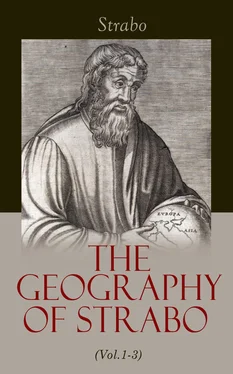Strabo - The Geography of Strabo (Vol.1-3)
Здесь есть возможность читать онлайн «Strabo - The Geography of Strabo (Vol.1-3)» — ознакомительный отрывок электронной книги совершенно бесплатно, а после прочтения отрывка купить полную версию. В некоторых случаях можно слушать аудио, скачать через торрент в формате fb2 и присутствует краткое содержание. Жанр: unrecognised, на английском языке. Описание произведения, (предисловие) а так же отзывы посетителей доступны на портале библиотеки ЛибКат.
- Название:The Geography of Strabo (Vol.1-3)
- Автор:
- Жанр:
- Год:неизвестен
- ISBN:нет данных
- Рейтинг книги:3 / 5. Голосов: 1
-
Избранное:Добавить в избранное
- Отзывы:
-
Ваша оценка:
- 60
- 1
- 2
- 3
- 4
- 5
The Geography of Strabo (Vol.1-3): краткое содержание, описание и аннотация
Предлагаем к чтению аннотацию, описание, краткое содержание или предисловие (зависит от того, что написал сам автор книги «The Geography of Strabo (Vol.1-3)»). Если вы не нашли необходимую информацию о книге — напишите в комментариях, мы постараемся отыскать её.
The Geography of Strabo (Vol.1-3) — читать онлайн ознакомительный отрывок
Ниже представлен текст книги, разбитый по страницам. Система сохранения места последней прочитанной страницы, позволяет с удобством читать онлайн бесплатно книгу «The Geography of Strabo (Vol.1-3)», без необходимости каждый раз заново искать на чём Вы остановились. Поставьте закладку, и сможете в любой момент перейти на страницу, на которой закончили чтение.
Интервал:
Закладка:
3. Posidonius blames Polybius for asserting that the region of the earth, situated under the equator, is the highest, since a spherical body being equal all round, no part can be described as high; and as to mountainous districts, there are none under the equator, it is on the contrary a flat country, about the same level as the sea; as for the rains which swell the Nile, they descend from the mountains of Ethiopia. Although advancing this, he afterwards seems to adopt the other opinion, for he says that he fancies there may be mountains under the equator, around which the clouds assembling from both of the temperate zones, produce violent rains. Here is one manifest contradiction; again, in stating that the land under the equator is mountainous, another contradiction appears. For they say that the ocean is confluent, how then can they place mountains in the midst of it? unless they mean to say that there are islands. However, whether such be the fact does not lie within the province of geography to determine, the inquiry would better be left to him who makes the ocean in particular his study.
4. Posidonius, in speaking of those who have sailed round Africa, tells us that Herodotus was of opinion that some of those sent out by Darius actually performed this enterprise; 645and that Heraclides of Pontus, in a certain dialogue, introduces one of the Magi presenting himself to Gelon, 646and declaring that he had performed this voyage; but he remarks that this wants proof. He also narrates how a certain Eudoxus of Cyzicus, 647sent with sacrifices and oblations to the Corean games, 648travelled into Egypt in the reign of Euergetes II.; 649and being a learned man, and much interested in the peculiarities of different countries, he made interest with the king and his ministers on the subject, but especially for exploring the Nile. It chanced that a certain Indian was brought to the king by the [coast]-guard of the Arabian Gulf. They reported that they had found him in a ship, alone, and half dead: but that they neither knew who he was, nor where he came from, as he spoke a language they could not understand. He was placed in the hands of preceptors appointed to teach him the Greek language. On acquiring which, he related how he had started from the coasts of India, but lost his course, and reached Egypt alone, all his companions having perished with hunger; but that if he were restored to his country he would point out to those sent with him by the king, the route by sea to India. Eudoxus was of the number thus sent. He set sail with a good supply of presents, and brought back with him in exchange aromatics and precious stones, some of which the Indians collect from amongst the pebbles of the rivers, others they dig out of the earth, where they have been formed by the moisture, as crystals are formed with us. 650
[He fancied that he had made his fortune], however, he was greatly deceived, for Euergetes took possession of the whole treasure. On the death of that prince, his widow, Cleopatra, 651assumed the reins of government, and Eudoxus was again despatched with a richer cargo than before. On his journey back, he was carried by the winds above Ethiopia, and being thrown on certain [unknown] regions, he conciliated the inhabitants by presents of grain, wine, and cakes of pressed figs, articles which they were without; receiving in exchange a supply of water, and guides for the journey. He also wrote down several words of their language, and having found the end of a prow, with a horse carved on it, which he was told formed part of the wreck of a vessel coming from the west, he took it with him, and proceeded on his homeward course. He arrived safely in Egypt, where no longer Cleopatra, but her son, 652ruled; but he was again stripped of every thing on the accusation of having appropriated to his own uses a large portion of the merchandise sent out.
However, he carried the prow into the market-place, and exhibited it to the pilots, who recognised it as being come from Gades. 653The merchants [of that place] employing large vessels, but the lesser traders small ships, which they style horses, from the figures of that animal borne on the prow, and in which they go out fishing around Maurusia, 654as far as the Lixus. 655Some of the pilots professed to recognise the prow as that of a vessel which had sailed beyond the river Lixus, but had not returned. 656
From this Eudoxus drew the conclusion, that it was possible to circumnavigate Libya; he therefore returned home, and having collected together the whole of his substance, set out on his travels. First he visited Dicæarchia, 657and then Marseilles, and afterwards traversed the whole coast as far as Gades. Declaring his enterprise everywhere as he journeyed, he gathered money sufficient to equip a great ship, and two boats, resembling those used by pirates. On board these he placed singing girls, physicians, and artisans of various kinds, and launching into open sea, was carried towards India by steady westerly winds. 658However, they who accompanied him becoming wearied with the voyage, steered their course towards land, but much against his will, as he dreaded the force of the ebb and flow. What he feared actually occurred. The ship grounded, but gently, so that it did not break up at once, but fell to pieces gradually, the goods and much of the timber of the ship being saved. With these he built a third vessel, closely resembling a ship of fifty oars, and continuing his voyage, came amongst a people who spoke the same language as that some words of which he had on a former occasion committed to writing. He further discovered, that they were men of the same stock as those other Ethiopians, and also resembled those of the kingdom of Bogus. 659However, he abandoned his [intended] voyage to India, and returned home. On his voyage back he observed an uninhabited island, well watered and wooded, and carefully noted its position. Having reached Maurusia in safety, he disposed of his vessels, and travelled by land to the court of Bogus. He recommended that sovereign to undertake an expedition thither.
This, however, was prevented on account of the fear of the [king’s] advisers, lest the district should chance to expose them to treachery, by making known a route by which foreigners might come to attack them. Eudoxus, however, became aware, that although it was given out that he was himself to be sent on this proposed expedition, the real intent was to abandon him on some desert island. He therefore fled to the Roman territory, and passed thence into Iberia. Again, he equipped two vessels, one round and the other long, furnished with fifty oars, the latter framed for voyaging in the high seas, the other for coasting along the shores. He placed on board agricultural implements, seed, and builders, and hastened on the same voyage, determined, if it should prove too long, to winter on the island he had before observed, sow his seed, and having reaped the harvest, complete the expedition he had intended from the beginning.
5. “Thus far,” says Posidonius, “I have followed the history of Eudoxus. What happened afterwards is probably known to the people of Gades and Iberia;” “but,” says he, “all these things only demonstrate more clearly the fact, that the inhabited earth is entirely surrounded by the ocean.”
“By no continent fettered in,
But boundless in its flow, and free from soil.”
Posidonius is certainly a most strange writer; he considers that the voyage of the Magus, 660related by Heraclides, wants sufficient evidence, and also the account given by Herodotus of those sent out [to explore] by Darius. But this Bergæan 661nonsense, either the coinage of his own brain, or of some other story-teller, in whom he trusts, he pretends to be worthy of our belief. But in the first place, what is there credible in this tale of the Indian missing his way? The Arabian Gulf, which resembles a river, is narrow, and in length is from 5000 to 10,000 stadia up to its mouth, where it is narrowest of all. It is not likely that the Indians in their voyage out would have entered this Gulf by mistake. The extreme narrowness of the mouth must have warned them of their error. And if they entered it voluntarily, then there was no excuse for introducing the pretext of mistake and uncertain winds. And how did they suffer all of themselves but one to perish through hunger? And how was it that this surviver was able to manage the ship, which could not have been a small one either, fitted as it was for traversing such vast seas? What must have been his aptitude in learning the language of the country, and thus being able to persuade the king of his competence, as leader of the expedition? And how came it that Euergetes was in want of such guides, so many being already acquainted with this sea? How was it that he who was sent by the inhabitants of Cyzicus to carry libations and sacrifices, should forsake his city and sail for India? How was it that so great an affair was intrusted to him? And how came it that on his return, after being deprived of every thing contrary to expectation, and disgraced, a yet larger cargo of goods was intrusted to him? And when he had again returned into Ethiopia, what cause induced him to write down the words, or to inquire whence came the portion of the prow of the boat? For to learn that it was a ship of some sailing from the west, would have been no information to him, as he himself would have to sail from the west on his voyage back. When, on his return to Alexandria, he was detected in having appropriated to himself much of the merchandise, how came it that he was not punished, but allowed to go about interrogating the pilots, and exhibiting his bit of prow? And that one of these fellows actually recognised the relic, is it not delicious! Eudoxus too believed it, this is still richer; and inspired by the hope, hastens home, and then starts on a voyage beyond the Pillars of Hercules! But he could never have left Alexandria without a passport, still less after having stolen the royal property. To set sail on the sly was impossible, as the port and every other exit was kept by a numerous guard, which still exists, as we very well know who have lived in Alexandria for a long time, although it is not so strict since the Romans have had possession, but under the kings the guards were infinitely more alert. But allowing that he reached Gades, that he there constructed ships, and sailed thence with quite a royal fleet, when his vessel was shattered, by what means was he able to construct a third boat in a desert land? And when, being again on his voyage, he found that the Ethiopians of the West spoke the same language as those of the East, how came it that he, so proud of his travelling propensities, forgot the completion of his voyage, when he must have had so good an expectation that there was but little now left unexplored, but relinquishing these prospects, set his mind on the expedition being undertaken by Bogus? How did he become acquainted with the snare spread for him by that king? And what advantage would have accrued to Bogus by making away with the man, rather than by dismissing him? When Eudoxus learned the plot against himself, what means had he to escape to safer quarters? It is true that not one of these situations was actually impossible, but still they were difficult circumstances, such as one rarely escapes from by any prosperous fortune. How ever, he always came off with good luck, notwithstanding he was never out of danger. Besides this, how did it happen, that having escaped from Bogus, he was not afraid to sail round Africa a second time, with all the requisites for taking up his abode on the island? All this too closely resembles the falsehoods of Pytheas, Euhemerus, and Antiphanes. They however may be pardoned; for their only aim was that of the juggler. But who can forgive a demonstrator and philosopher, and one too striving to be at the head of their order? it is really too bad!
Читать дальшеИнтервал:
Закладка:
Похожие книги на «The Geography of Strabo (Vol.1-3)»
Представляем Вашему вниманию похожие книги на «The Geography of Strabo (Vol.1-3)» списком для выбора. Мы отобрали схожую по названию и смыслу литературу в надежде предоставить читателям больше вариантов отыскать новые, интересные, ещё непрочитанные произведения.
Обсуждение, отзывы о книге «The Geography of Strabo (Vol.1-3)» и просто собственные мнения читателей. Оставьте ваши комментарии, напишите, что Вы думаете о произведении, его смысле или главных героях. Укажите что конкретно понравилось, а что нет, и почему Вы так считаете.












![Anne Blunt - A Pilgrimage to Nejd, the Cradle of the Arab Race. Vol. 2 [of 2]](/books/750183/anne-blunt-a-pilgrimage-to-nejd-the-cradle-of-the-thumb.webp)